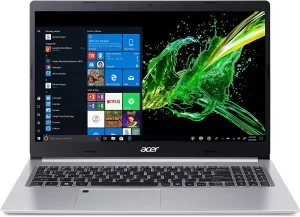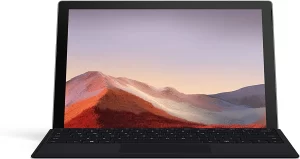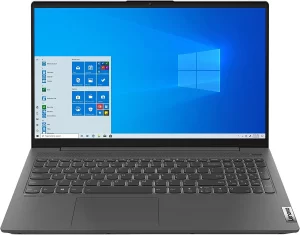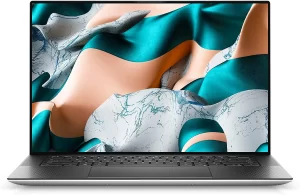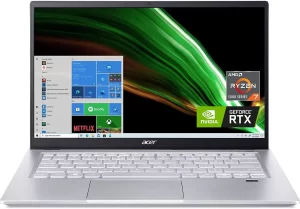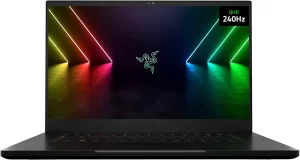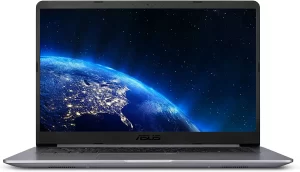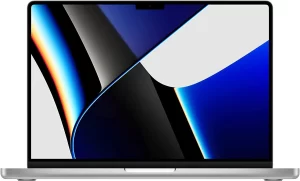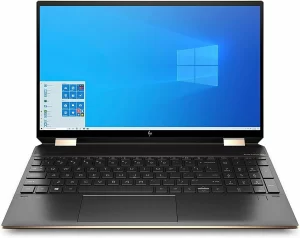Seeking the perfect laptop for your podcasting needs? Our well-researched list of the top 9 laptops for podcasting, along with a handy buying guide, ensures you find the ideal device for recording, editing, & managing your audio files. Let’s explore these podcasting-friendly laptops & help you make a confident choice for your creative endeavors.
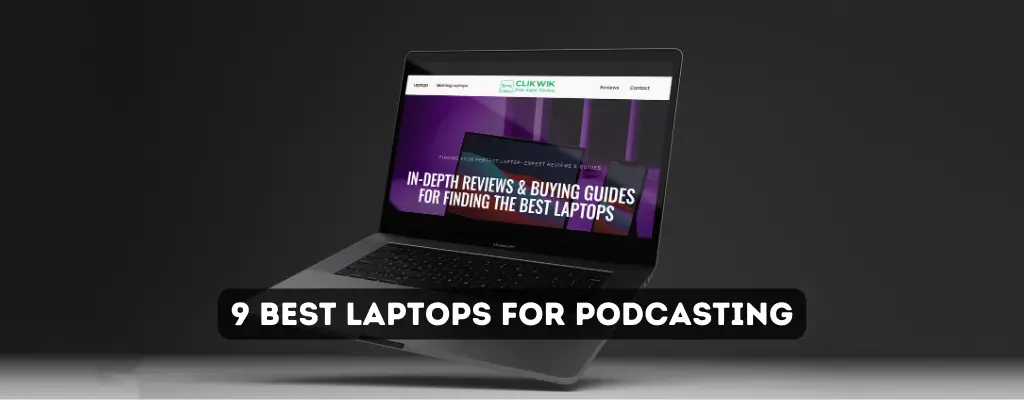
| # | Products | Description | Unique factors | Price |
|---|---|---|---|---|
| 1 | Microsoft Surface Pro 7 | 2-in-1 laptop, Intel Core, integrated graphics | Surface Pen support, detachable Type Cover, Windows Hello facial recognition | View |
| 2 | Lenovo IdeaPad 5 (15.6-inch) | Everyday use, Intel Core/AMD Ryzen, integrated graphics | Rapid Charge battery, Dolby Audio, privacy shutter on webcam | View |
| 3 | Dell XPS 15 | High-performance, Intel Core, dedicated graphics | InfinityEdge display, Waves Nx 3D audio, carbon fiber palm rest | View |
| 4 | Acer Swift X | Ultrabook, AMD Ryzen, NVIDIA dedicated graphics | Lightweight design, long battery life, fingerprint reader | View |
| 5 | Razer Blade 15 | Intel Core, NVIDIA dedicated graphics | Razer Chroma RGB, vapor chamber cooling, THX Spatial Audio | View |
| 6 | ASUS VivoBook F510UA | Everyday use, Intel Core, integrated graphics | NanoEdge display, ASUS Splendid technology, ergonomic keyboard | View |
| 7 | Apple MacBook Pro | High-performance, Apple M1/Intel Core, integrated/dedicated graphics | Retina display, Touch Bar, macOS ecosystem | View |
| 8 | HP Spectre | Premium 2-in-1, Intel Core, integrated graphics | Gem-cut design, HP Sure View privacy screen, Thunderbolt 4 ports | View |
Best Laptops for Podcasting
1. Acer Aspire 5
Housing the 10th Generation Intel core processor, Acer Aspire 5 is ideal for podcasters in several ways. You get a decent amount of processing power and plenty of storage at an affordable price. It also features modern equipment that will not disappoint when it comes to podcasting.
Acer Aspire 5 has a widescreen, backlit LED display with incredible graphics. Some features that stood out were the backlit keyboard with a fingerprint reader and 8 hours of battery life even though this laptop features a heavy processor.
With Aspire 5, loads of connectivity options, and a futuristic performance that will not disappoint podcasters. You have a fast startup and an expanded start menu due to Windows 10 S mode. Since the laptop features a heavy processor, the cooling system is quite strong and noisy.
Pros
- Intelligent performance with superior display
- Attractive design
- Value for money
- Plenty of ports
- Good audio
- Extensive storage
- Solid battery life
Cons
- No slot for SD card
- Fans can be very noisy
| Storage | 265 GB |
| Operating System | Windows 10 Home |
| CPU | Intel Core i3-1115G4 |
| GPU | Intel UHD 620 |
| Screen Size | 15.6-inch |
| RAM | 8 GB DDR4 |
| Display | 1920 x 1080 |
| Battery | Lasts up to 8 hours |
2. Microsoft Surface Pro 7
If you are looking for a laptop under $500 that offers the best possible features for podcasters, you cannot go wrong with Microsoft Surface Pro 7. This is essentially a heavy-duty, yet slim, 2-in-notebook. You get a thin, aluminum alloy chassis with a touchscreen and a stylus pen to make editing easier for you.
The HD display is also superior with the unbelievable 2736 x 1824 resolution and an IPS panel. This laptop is also ultraportable with a 12-inch screen. In terms of audio, you get the Dolby audio system that delivers an on-point pitch, bass, and volume.
With 10-hour battery life and the 10th Gen Intel iCore processor, you cannot get a better product for podcasting or general use under $500. Its versatility is another selling point since you can use it as either a tablet or a laptop, for hardcore professional tasks or just for multimedia consumption.
Pros
- Budget-friendly
- Superior HD high-resolution display
- Exceptional battery life
- Good audio quality
- Four thunderbolt ports
- Ultra-portable and travel friendly
Cons
- Gets hot easily
- Loud fan noise
| Storage | 128 GB |
| Operating System | Windows 10 Home |
| CPU | Intel Core i3-1005G1 |
| GPU | Intel UHD Graphics (i3) |
| Screen Size | 12.3-inch |
| RAM | 16 GB |
| Display | 2736 x 1824 |
| Battery | Lasts up to 10.5 hours |
3. Lenovo IdeaPad 5 (15.6-inch)
This super portable yet affordable notebook is perfect for podcasters who are looking for an all-around winner. Its heavy-duty processor can run multiple applications without lagging or slowing down. Lenovo IdeaPad 5 also houses an ergonomic backlit keyboard with a very responsive touchpad so that you can seamlessly edit your podcasts.
IdeaPad 5 houses an unbelievable 1 TB SSD storage, and you can hardly run out of space with this laptop. A 15-inch anti-glare IPS display with a touchscreen is also a selling point. At 3.47 pounds, this is incredibly lightweight, slim, and therefore portable. 2 front Dolby Audio speakers have exceptional sound quality as well.
This laptop has all the important ports with a card reader. You get a sturdy, yet attractive aluminum chassis. Lenovo IdeaPad 5 also has 9 hours of battery life. This laptop is good for outdoor use too, due to its bright IPS panel.
Pros
- All-round winner: excellent specs and affordable
- Superior Display
- Fingerprint login
- 720p HD front camera
- Durable yet portable
- Reliable performance with 12th Gen Intel Processor
- Excellent Battery Life
Cons
- No dedicated graphics card, laptop cannot handle demanding work
- No Thunderbolt ports
- Only one USB-C port
- Underwhelming color production due to low image contrast.
| Storage | 1 TB |
| Operating System | Windows 11 |
| CPU | AMD Ryzen 5 5500U |
| GPU | AMD Ryzen RX Vega 7 |
| Screen Size | 15.6-inch |
| RAM | 8 GB |
| Display | 1920 x 1080 |
| Battery | Lasts up to 9 hours |
4. Dell XPS 15
Featuring Intel’s 9th Generation processor and a dedicated NVIDIA GeForce graphics card, this laptop delivers both ideal performance and good visuals. As a podcaster, you can seamlessly edit your audio and videos with 4GB of dedicated memory. Dell XPS 15 has 16GB RAM, enough to store and access your audiovisual files.
This laptop has exceptional build quality, though, at 4 pounds, it is slightly heavier than most other models. The screen is covered with the novel Corning Gorilla Glass which saves it from scratches. A backlit keyboard with Windows Precision Touchpad makes editing a breeze.
Overall, this is a great laptop for podcasters with all the features you need, including all the important ports, good audio quality, and exceptional touchscreen display. You also get a 9-hour battery life which is more than most people need. One thing which might bother podcasters is that the webcam on Dell XPS 15 is below the display which can result in unflattering angles.
Pros
- Excellent all-round laptop
- Impressive processing power
- Value for money
- Great storage capacity
- Superior display
- Good battery life
Cons
- Underwhelming, ordinary design
- Awkward webcam placement (below display)
- Cooling cannot sustain the heavy processor
| Storage | 1 TB |
| Operating System | Windows 10 |
| CPU | Intel Core i7-12900H |
| GPU | NVIDIA GeForce GTX 1650 |
| Screen Size | 15.6-inch |
| RAM | 16 GB |
| Display | |
| Battery | 3840 x 2160 |
5. Acer Swift X
This affordable laptop features a high-speed processor and good storage, ideal for podcasters who want to easily store and access their audio files. Acer Swift X is specifically designed for creators with uncompromising battery life, quick processing power, and incredible graphics.
Some special features that we liked are multi-touch gesture, Amazon’s cloud-based voice service Alexa, and a biometric fingerprint reader. This laptop weighs only 3.06 pounds, with a slim chassis that you can carry easily with you.
Overall, this laptop is ideal for anyone who wants high processing power on a budget. Acer Swift X delivers a solid multi-core performance. A 14-inch screen on a highly portable laptop is also surprising. You also get a 9-hour battery life with this powerhouse.
Pros
- Superior processing power
- High-quality built-in microphone
- Dual, front-facing speakers by DTS audio
- Plenty of ports
- Thin and lightweight, highly portable
- Excellent battery life with fast charging system
Cons
- Underwhelming design
- GPU performance could be better
- Constant fan noise
| Storage | 512 GB |
| Operating System | Windows 10 Home |
| CPU | AMD Ryzen 7 5800U |
| GPU | NVIDIA RTX 3050 Ti |
| Screen Size | 14-inch |
| RAM | 15 GB |
| Display | 1920 x 1080 |
| Battery | Lasts up to 9 hours |
6. Razer Blade 15
Built for hardcore gamers, this laptop is ideal for serious podcasters who demand excellent productivity. Razer Blade 15 houses a powerful processor that can handle even the most demanding workflow. You get a robust, yet thin build and plenty of storage at a hefty price which can be justified considering this laptop’s performance.
This laptop will not slow or lag thanks to a perfect combination of 265GB SSD and 2TB HDD storage. You get all the important ports including 3 USB-A ports, one Thunderbolt 3 port, and a headphone jack. Great audio quality and graphics also make this laptop suitable for podcasters.
Razer Blade 5 also delivers exceptional graphics due to its 4K OLED panel and HDR 400 true black display which increases color contrast. This laptop features a touchscreen, with a fast 1ms response time, so that you can easily edit your podcasts. 6 hours of battery life can bother some people, but this is common among laptops with high processing power.
Pros
- Superior performance and speed
- Good storage
- Thin, portable aluminum body
- Vivid visuals due to a dedicated graphics card
- Extensive connectivity options
Cons
- Fairly Expensive
- Low battery life
| Storage | 256 GB |
| Operating System | Windows 10 Home |
| CPU | 11th Gen Intel Core i7-11800H |
| GPU | NVIDIA GeForce RTX 3070 |
| Screen Size | 15.6-inch |
| RAM | 16 GB |
| Display | 3840 x 2160 |
| Battery | Lasts up to 6 hours |
7. ASUS VivoBook F510UA
This laptop is perfect for podcasters looking for a decent, on-budget Windows laptop. ASUS VivoBook has all the essential features you need in a laptop for podcasting, yet comes at a great price. You get a dual-core processor, 8 GB RAM, and 128 GB solid-state storage, which is all you need without much latency on your podcasts.
Some really good features that make this laptop stand out are an ergonomic backlit keyboard, fingerprint scanner, and ultra-portability with a full HD Wideview NanoEdge display. This laptop also gives you good sound quality without a headset, perfect for professionals who need an affordable laptop with decent performance.
This laptop runs on Windows which means you cannot use GarageBand, however, you can look for other DAWs suitable for Windows, and you don’t have to spend a fortune on a MacBook.
Pros
- Value for money
- Large screen yet lightweight and portable
- Smooth processing power
- Meets minimum requirements for RAM
- Good sound quality
- Excellent screen to body ratio: 80%
- All ports available
Cons
- Low battery life
- Low processing power when compared to other products such as MacBooks
| Storage | 1 TB |
| Operating System | Windows 10 |
| CPU | Intel Core i5- 7200U |
| GPU | Intel UHD Graphics 620 |
| Screen Size | 15.6-inch |
| RAM | 8 GB |
| Display | 1920 x 1080 |
| Battery | Lasts up to 5 hours |
8. Apple MacBook Pro
Apple laptops are famous for their incredible performance and extraordinary specs. If you are a hardcore Apple fanatic or simply want to run your podcast through an Apple-based digital audio workstation, you need to invest in a product that has macOS. This decision leaves you with two options for laptops: MacBook Pro and MacBook Air.
Investing in a MacBook also means you get Apple’s signature M1 chip, which comes with a built-in Neural Engine. The M1 chip is intended to speed up particular operations across the Mac for things like voice recognition, video analysis, and more—a huge plus for podcasting.
We would recommend MacBook Pro for podcasting as it features a multi-core processor which is essential for any DAW software. MacBook Pro is 8-times faster than Apple’s previous laptops due to its 8-core processor.
Pros
- Unrivaled specs and performance
- 2 TB substantial solid-state storage
- 20-hour battery life
- Full HD display
- High speed 8-core processor
Cons
- Super Expensive
- You need to pay for most apps that run on MacOS
- Repetitive design
- No type C port
| Storage | 2 TB |
| Operating System | MacOS |
| CPU | Intel Core i8 |
| GPU | Apple M1 32-core |
| Screen Size | 16-inch |
| RAM | 16 GB |
| Display | 3024 x 1964 |
| Battery | Lasts up to 20 hours |
9. HP Spectre
This laptop is ideal for podcasters who want a 2-in-1 device they could use outdoors. It features an incredibly lightweight, bendable design that is easy to maneuver outside. Equipped with a 10th Gen Intel Core i7 processor and 16GB RAM, this laptop gives you everything you need in a device suitable for podcasting.
Although this laptop is not as powerful as the other laptops on this list, the additional features and ease of use make this laptop stand out. 1TB storage enables fast booting so that you are comfortable with editing without any slowdown. HP Spectre also has decent 8-hour battery life.
Overall, this is the most user-friendly laptop on this list, especially beneficial for podcasters. You get all important ports with ample storage on a highly portable device. The backlit keyboard enables editing in the dark too.
Pros
- Ideal for outdoor use
- Very lightweight at 2.9 pounds
- Bendable keyboard by up to 360 degrees
- Slim 2-in-1 design
- Good battery life
- Wide, 13-inch display on a small device
- Houses 4 speakers for exceptional audio quality
Cons
- Unimpressive processing power
- No dedicated graphics card
- Noisy fans
| Storage | 265 GB |
| Operating System | Windows 10 |
| CPU | Intel Core i7 |
| GPU | Intel UHD Graphics 620 |
| Screen Size | 13-inch |
| RAM | 8 GB |
| Display | 1920 x 1080 |
| Battery | Lasts up to 8 hours |
The Complete Guide to Buying the Best Laptop for Podcasting
Podcasting has its own needs when it comes to laptops. You need the right specifications to be able to easily create, edit, save, and access your podcasts. To help you find exactly what you’re looking for, we’ve broken down all the technical terms and laptop characteristics in this guide.
Do you need a good laptop for Podcasting?
Short answer? YES
With the aid of a good laptop, you can creatively edit and enhance your podcasts. A laptop with the right specs enables you to create and record the podcast of your dreams. It also helps you take advantage of powerful editing tools provided by several editing suites, including transitions, visual effects, music, and more.
Is Surface Pro 7 good for Podcasts?
Surface Pro 7 houses good processing power and offers several features that are suitable for podcasting. This slim, portable, 2-in-1 machine is both versatile and high-performance. Let’s see what you need for a good podcasting laptop versus what Surface Pro 7 offers.
Display and Screen Quality
Although podcasting is mainly an audio medium, you need a good screen and display to be able to effortlessly edit your podcast. Larger screens are usually better but choosing a big screen means compromising on portability and budget, since bigger laptops are heavier and more expensive.
What You Need
- At least a 13-inch display with a resolution of 1920 x 1020
- HD display
- The touchscreen makes editing easier but is not a necessity
What Surface Pro 7 Offers
- 3-inch screen with 2736 x 1824 resolution
- The touchscreen comes with a stylus
CPU and Processing Power
In simple words, the Central Processing Unit tells you your laptop’s processing power. You need at least a multi-core processor that delivers high processing speed. Three different types of CPUs are Apple M1, Intel Core, and AMD. Your choice ultimately boils down to preference and your budget since MacBooks (Apple M1) are very expensive.
What You Need
- Quad-core 10th Generation Intel i7 processor
- 1 GHz processing speed
What Surface Pro 7 Offers
- 3-inch screen with 2736 x 1824 resolution
- The touchscreen comes with a stylus
Ports and Inputs
For podcasting, you need all the major ports including a Thunderbolt port, USB type A and C, an HDMI input, a headphone jack, and an SD card slot. For input, you need a good keyboard with a responsive touchpad. A touchscreen with a stylus adds further points to a laptop.
What You Need
- At least one Thunderbolt Port
- USB A and C Port
- Keyboard with decent key travel and a responsive touchpad
What Surface Pro 7 Offers
- Both USB-C and USB-A ports
- Four Thunderbolt Ports
- Headphone jack
- Card reader
- Touchscreen with a stylus
- Keyboard with backlit keys and a trackpad that has optimum navigation space
Operating System
Your choice of the operating system boils down to three things: your preference, the editing software you use (DAW), and your budget. If you are familiar with one specific OS you might find it difficult to switch. Similarly, if you want to use Logic Pro or Garageband, you will have to invest in a MacOS although Apple devices are fairly expensive.
What You Need
- An OS that runs your preferred DAWs
- Depends on your budget
What Surface Pro 7 Offers
- Uses Windows 10
- Can run several DAWs due to its multi-core processor
- Cannot run Garageband or MacOS
Memory
Your laptop’s RAM or memory decides how much data you can store at a time and how fast your laptop responds. Low RAM can result in slowdown or lagging even if your laptop houses a powerful processor. This means you need decent RAM to be able to edit and access your podcasts seamlessly.
What You Need
- At least 8GB RAM or 16GB if you are a full time podcaster
What Surface Pro 7 Offers
- 16GB RAM makes retrieving data a breeze
Latency
You must have heard this term several times even if you are remotely familiar with podcasting. Latency is essentially the time between the input and output of an audio signal. As a podcaster, you need to have the shortest possible delay in audio input and output.
- Lowest possible latency for quick output
- High performing processor and a good RAM enable 2.1 milliseconds of latency
- Due to low processing power, laptop can lag when external devices are attached
Final Verdict!
Overall, the Microsoft Surface Pro X ticks all boxes of being a good laptop for podcasters. It is an attractive, portable, and high-processing device. It is also highly affordable. The only drawback is its low processing power which sometimes results in a slowdown when you attach external hardware.
Other Things to Consider
Some other things to consider when it comes to buying the best laptop for podcasting are battery life, weight, and audio. If you travel a lot, you need a laptop that offers at least 8 hours of battery. Look for slim, lightweight options if you are always on the go. There are several 2-in-1 options in the market with a bendable or detachable keyboard as well. These are easy to carry and handle. As podcasting is mainly an audio feat, focus on getting the best speakers. Most laptops house 2 speakers but some, like HP Spectre, have 4 speakers too.

